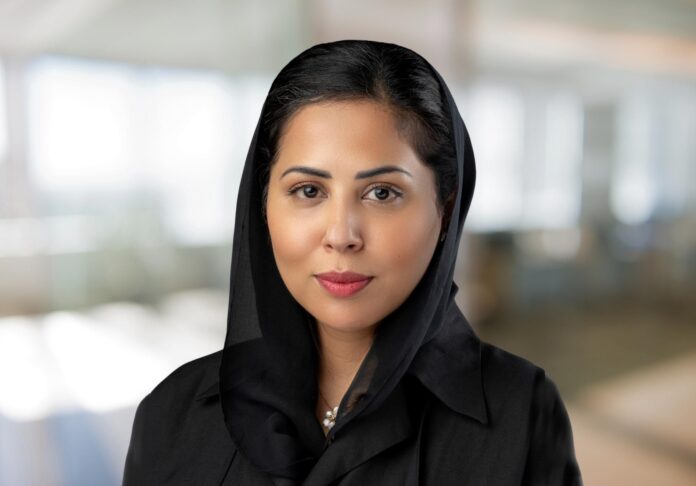A year into her role as Saudi Arabia head for Northern Trust asset servicing, Kholoud Al Dosari talks to Laraib Shahid about diversity in the Kingdom.
It’s almost a year since Kholoud Al Dosari was appointed to the role of chief executive at the Northern Trust Company of Saudi Arabia. Her American employer’s drive for diversity was instrumental in attracting her, she says.
Northern Trust is committed to its ‘Business Diversity360’ approach in the region, describing its role as “to help break down barriers to growth for diverse business owners”. About 60% of the five top management teams in Saudi Arabia are women, says Al Dosari, adding that the firm works closely with professional associations and Saudi universities, from which it directly hires graduates.
A Saudi with 20 years’ experience in the financial sector, her specific role is to lead Northern Trust’s asset servicing business in the Kingdom.
The firm – which has assets under custody and administration of $5.431 trillion (€5 trillion) in Europe, the Middle East and Africa – opened its office in the capital city, Riyadh, in 2013 and employs about 30 people across Saudi Arabia and Abu Dhabi.
Saudi Arabia, she says, is making headway in the advancement of women and youth under the country’s Vision 2030 programme. It is meaningful progress to ensure equitable opportunities for men and women in all industries, she adds.
“In Saudi Arabia, we have equal pay for the same job when it comes to genders,” Al Dosari says.
One of Vision 2030’s objectives was to achieve a female participation rate of 30% in the workforce. In 2016, when the policy was brought in, that figure stood at 17%, but by 2022, eight years ahead of schedule, it had officially reached 33.6% – a significant development, says Al Dosari.
In her experience, the Saudi financial industry provides a particularly friendly working environment for women, she adds.
Optimism
“Motivation and curiosity” were what encouraged her to join the sector, she says. “Whenever I see something new or learn about something new, it drives me to go into it and take a deeper dive and understand it and gain expertise and experience.”
With a BSc in mathematics and statistics from Middlesex University in London, she initially embarked on a career in Saudi Arabia’s asset management industry.
She then moved into the public sector, working as executive director of CFA Society Saudi Arabia and then as director in the Financial Academy, the education arm of the Capital Market Authority.
When Northern Trust made her Saudi Arabia’s country head for asset servicing in 2022, she had already been an independent non-executive director with the firm since 2019.
But the challenges she’s encountered are more universal than Middle Eastern, she says. “There are many challenges that each and every one of us faces. These are not specific to the Saudi market, but globally we all have our own set of challenges.”
The challenge of an ageing population is not one that Saudi Arabia has to contend with, given that as many as half of its people are under 25. According to Al Dosari, this is seen as a national advantage; being able to nurture talent means the future belongs to the young.
She highlights the country’s optimism. “You can feel the energy that is in the country’s youth, with all the innovations that are occurring, including entrepreneurship. The passion among the youth is really coming through.”
A deep dive into diversity
With respect to diversity and inclusion, says Al Dosari, each company has a significant role in supporting its people, no matter where it operates in the world. It is programmes and opportunities put forward by companies that determine how inclusive their cultures are.
“When I personally take a deep dive into diversity and inclusion and try to kind of dissect it and understand what it is, I believe that mentorship plays a big part of career success.” Organisations that provide this support to their employees of both sexes have the most inclusive culture, she adds. Regardless of gender, to be in a leadership position “requires not only experience and knowledge but a certain skill set, and curiosity plays a huge factor. You need to be curious about what is ahead.”
She argues that diversity is also a central element of leadership. “Diversity is not only about gender, but also age, background and education, and all of these elements together create an inclusive culture.”
This leads to creativity and diverse opinions in teams – indeed, it is the team’s diversity that brings out the best results, she says.
Untimately, there’s a need to evolve and adapt to changing times and situations.
As they gain momentum across the globe, environmental, social and governance (ESG) policies have reached Saudi Arabia.
Vision 2030 is intended to diversify the Kingdom’s economy away from fossil fuels, says Al Dosari, and sustainability is at the heart of the policy. By 2060, she notes, Saudi Arabia aims to meet net-zero initiative targets.
In this respect, all initiatives undertaken in Saudi Arabia are encouraging and help to raise awareness of sustainability issues. An example is the recently signed trilateral memorandum of understanding between the Saudi Ministry of Economy and Planning, the Capital Market Authority and the Saudi Exchange Company to advance Saudi Arabia’s ESG standards.
When asked about the global economy, Al Dosari states that many organisations are dealing with uncertain situations this year.
“I am an optimist. I think if you are prepared, success will always follow.”
She adds: “I think each person has their own experience and journey, and I am grateful for mine.”
© 2023 funds global mena

